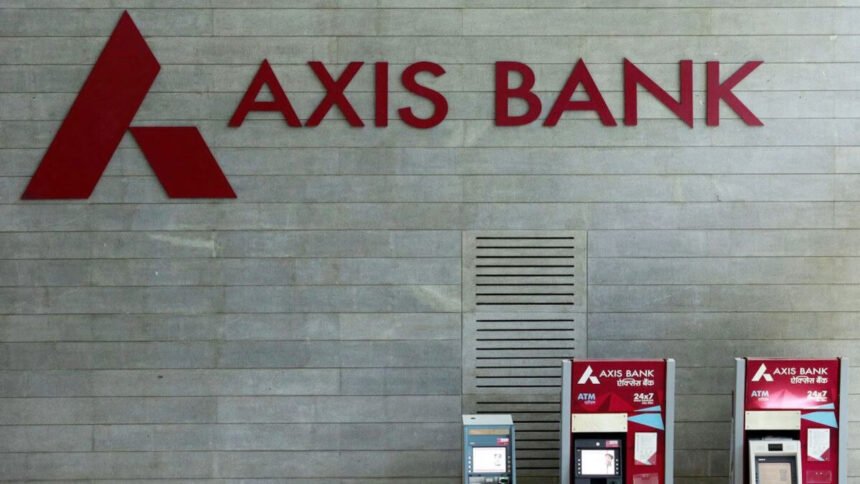Axis Bank’s latest financial performance has sent shockwaves through the market, prompting brokerages to reassess their target prices for the private lender. With higher slippages, slower deposit growth, and tight liquidity conditions, the outlook for Axis Bank share price remains uncertain. Let’s dive into the key highlights of Axis Bank’s Q3 FY25 results and what it means for investors.
Q3 FY25 Performance at a Glance
Axis Bank reported a modest 3.83% increase in net profit, reaching Rs 6,304 crore for the October-December 2024 period. However, this marked a 9% sequential decline compared to Rs 6,918 crore in the previous quarter. The financial performance was mixed, with certain key metrics showing strain amid broader economic challenges.
Interest Income and Expenses
The bank earned an interest income of Rs 30,954 crore in Q3 FY25, an 11% rise compared to Rs 27,961 crore in the same quarter last year. However, interest expenses also climbed 12% year-on-year, amounting to Rs 17,348 crore. This increase narrowed the bank’s net interest margin (NIM) to 3.93% from 4% a year ago and 3.99% in the previous quarter, signaling mounting cost pressures.
Slippages and Asset Quality Under Pressure
Gross slippages jumped 22% quarter-on-quarter, reaching Rs 5,400 crore, surpassing expectations of Rs 4,700 crore. The gross non-performing asset (GNPA) ratio inched up slightly to 1.46%. This deterioration highlights ongoing asset quality challenges that could weigh on the Axis Bank share price in the near term.
Muted Credit and Deposit Growth
The management’s outlook for both credit and deposit growth remains subdued until FY26. Tight liquidity conditions and an uncertain economic environment are expected to hinder expansion. These factors could continue to impact investor confidence in Axis Bank shares.
Brokerages React: Lower Targets Amid Concerns
Brokerages have responded swiftly to Axis Bank’s Q3 results, with many revising their price targets downward. Here’s a look at what leading analysts are saying:
- Nuvama Institutional Equities: Target price reduced to Rs 1,220 (from Rs 1,335), but the brokerage retained a ‘buy’ rating due to the stock’s valuation post-correction at 1.5x BV FY26E.
- Emkay Global: Lowered its target to Rs 1,300 (from Rs 1,400) while maintaining a ‘buy’ call.
- HSBC: Cut its target to Rs 1,170 (from Rs 1,350), citing tight liquidity that could impact medium-term loan growth.
- Morgan Stanley: Despite ongoing volatility, it reaffirmed its ‘overweight’ call with a target of Rs 1,300, emphasizing potential macroeconomic recovery.
- CLSA: Maintained its ‘outperform’ rating, setting a price target of Rs 1,400.
Core Operating Metrics: A Mixed Bag
Operating expenditure provided a silver lining, with core pre-provision operating profit rising 5% sequentially. However, core income remained weak, reflecting the broader strain on the bank’s financial health.
What Lies Ahead for Axis Bank?
Axis Bank’s management has signaled a cautious outlook for the near term, focusing on profitability rather than aggressive growth. This approach may help stabilize the Axis Bank share price, but challenges like rising credit costs and sluggish deposit growth will require careful navigation.
Investor Takeaway: Buy, Sell, or Hold?
So, what should investors do? The consensus among analysts leans towards retaining a ‘buy’ rating, albeit with reduced price targets. Here’s why:
- Valuation Support: Post-correction, the stock is trading at attractive valuation levels, offering a safety net.
- Potential Recovery: If macroeconomic conditions improve, Axis Bank’s well-leveraged position could yield significant gains.
- Short-Term Volatility: While asset quality concerns persist, long-term investors may find opportunities amid the volatility.
Read More: Govt Pay Boost: 8th Pay Commission Approved
Conclusion
Axis Bank’s Q3 results have unveiled a mix of challenges and opportunities. Higher slippages and slower growth are hurdles, but the bank’s strategic focus on profitability and its favorable valuation could provide a cushion. For investors, the decision to buy, sell, or hold Axis Bank shares should depend on individual risk appetite and investment horizons. Keep an eye on the macroeconomic environment and liquidity trends, as they will play a crucial role in shaping the bank’s future trajectory.










